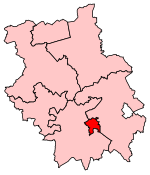Reality Checkpoint
1894 establishments in EnglandAccuracy disputes from May 2018All accuracy disputesAll pages needing cleanupBuildings and structures completed in 1894 ... and 8 more
Culture in CambridgeGrade II listed buildings in CambridgeGraffiti in EnglandIndividual lampsStreet lightingTerminology of the University of CambridgeUse British English from February 2023Wikipedia introduction cleanup from September 2021

Reality Checkpoint is a large cast-iron lamppost in the middle of Parker's Piece, Cambridge, England, at the intersection of the park's diagonal paths.
Excerpt from the Wikipedia article Reality Checkpoint (License: CC BY-SA 3.0, Authors, Images).Reality Checkpoint
Parkside, Cambridge Petersfield
Geographical coordinates (GPS) Address External links Nearby Places Show on map
Geographical coordinates (GPS)
| Latitude | Longitude |
|---|---|
| N 52.202175 ° | E 0.128179 ° |
Address
Reality Checkpoint
Parkside
CB1 1PN Cambridge, Petersfield
England, United Kingdom
Open on Google Maps









